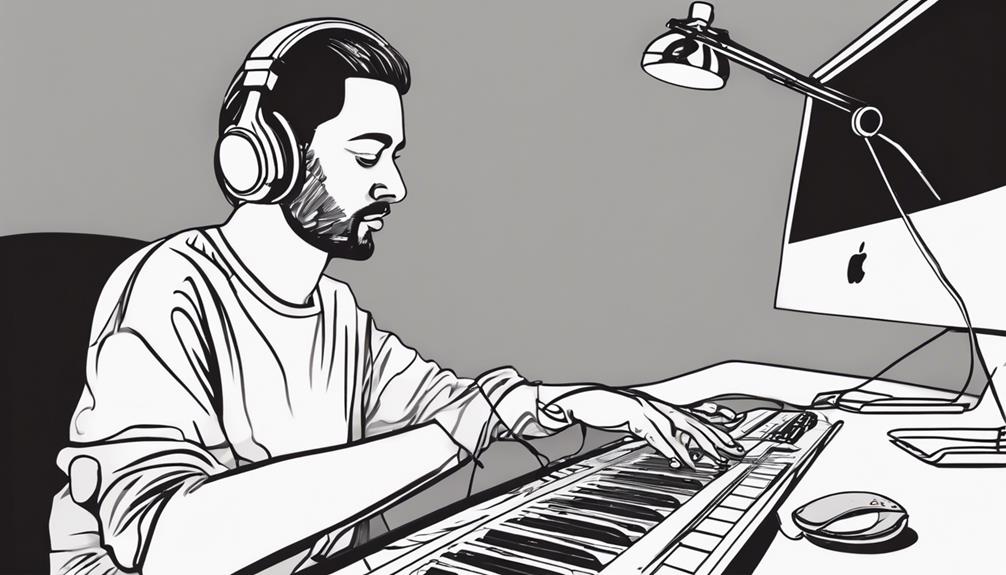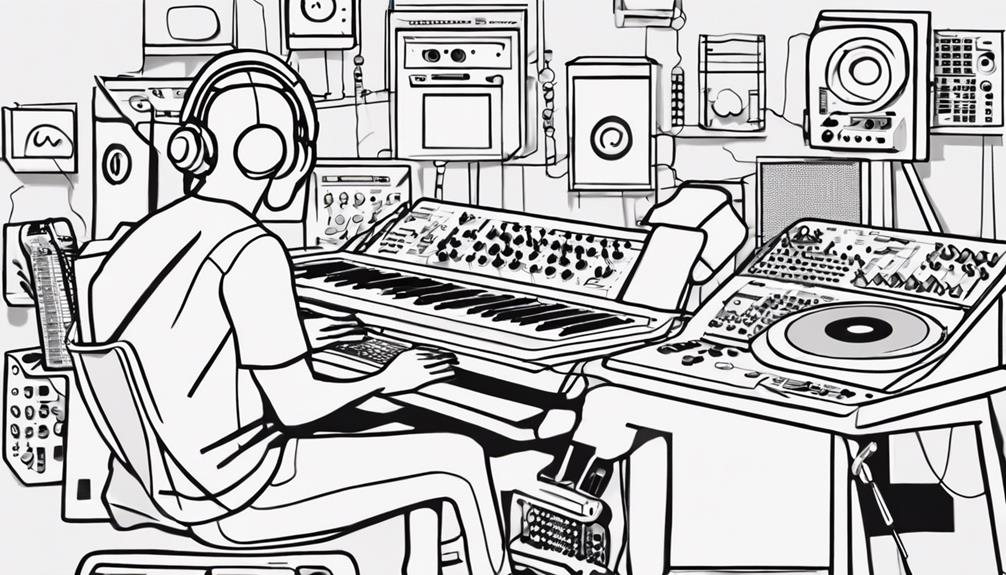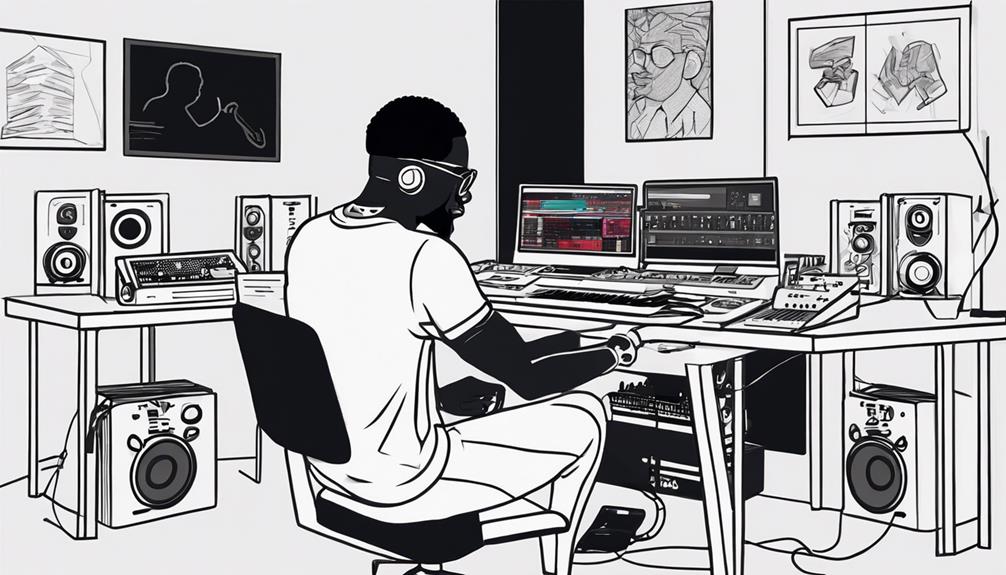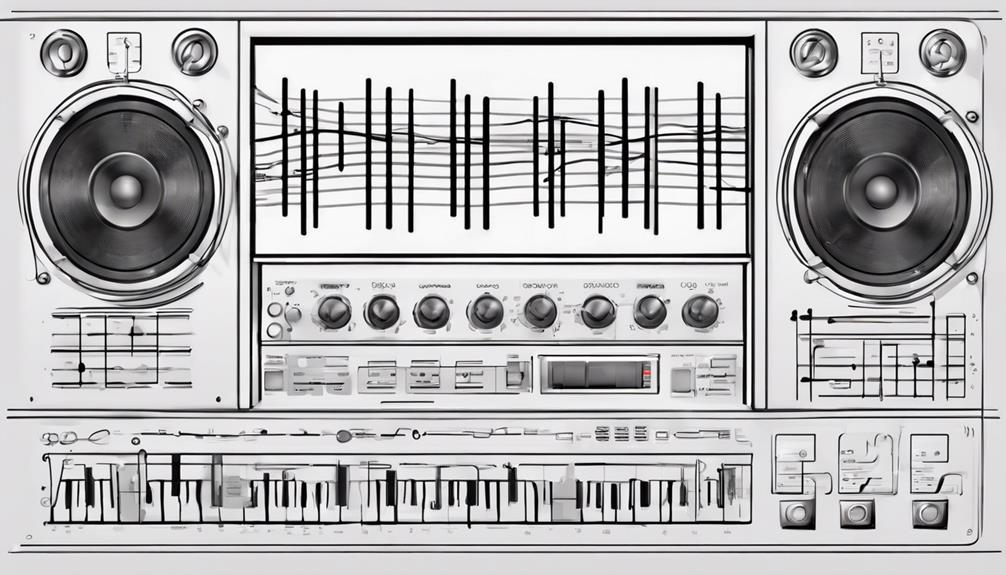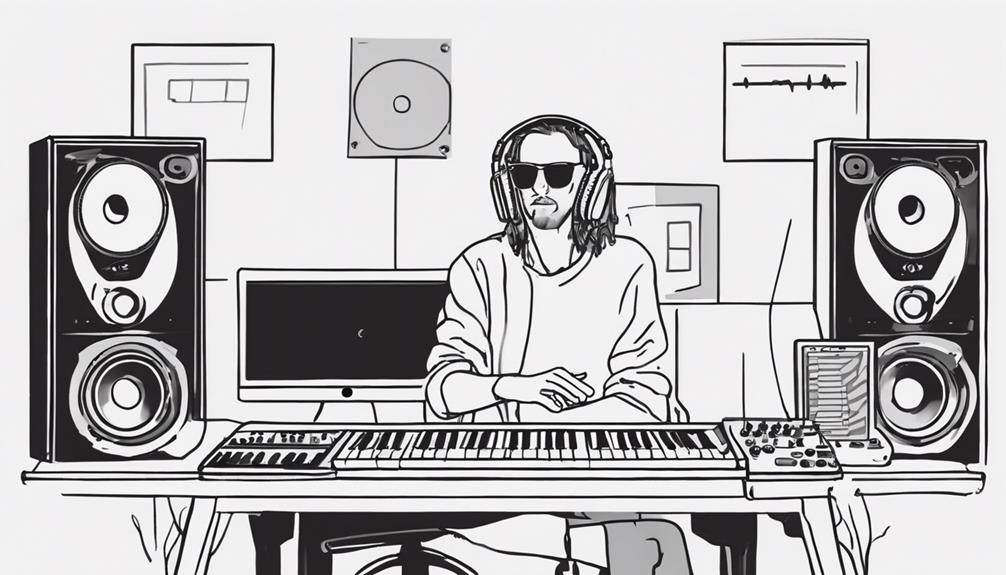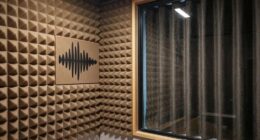To begin your music production journey, acquire essential gear like a computer, DAW, and quality headphones. Explore recording techniques by understanding signal flow and experimenting with microphone placement. Immerse yourself in editing basics using tools like cut, paste, and fade for polished tracks. Delve into the music production process from composition to recording to bring your vision to life. Discover beginner-friendly software such as Garageband and Ableton Live 11 Suite. As you continue to explore, you'll access a wealth of knowledge to propel your creative journey further.
Key Takeaways
- Invest in essential gear like a computer, DAW, and headphones.
- Learn basic recording techniques and experiment with microphone placement.
- Understand signal flow and utilize editing tools within the DAW.
- Explore beginner-friendly software like Garageband or Ableton Live.
- Kickstart creativity by starting with simple music projects and encouraging experimentation.
Music Production Basics
To start your journey into music production basics, you must understand the fundamental processes of recording, editing, arranging, mixing, and mastering music tracks.
Recording involves capturing audio using microphones and other equipment, while editing allows you to refine and enhance the recorded sounds.
Arranging is the art of organizing and structuring different elements within a composition to create a cohesive musical piece.
Mixing combines individual tracks into a final stereo audio file by adjusting levels, panning, and applying effects.
Lastly, mastering is the final step where the overall sound is polished and prepared for distribution.
For beginners in music production, grasping these basics is vital. It's important to familiarize yourself with music theory, as it forms the foundation for creating harmonious compositions.
Understanding sampling techniques and sound design will also enhance your skills in producing quality tracks.
Essential Gear for Beginners
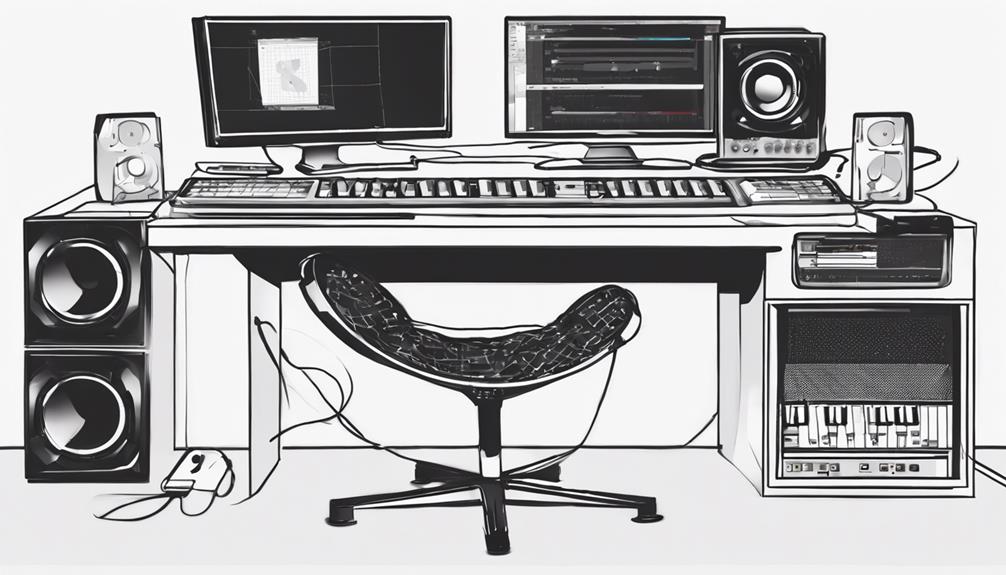
Beginners in music production require essential gear such as a computer, Digital Audio Workstation (DAW), headphones, and an audio interface to kickstart their journey into creating music. These tools form the backbone of your home studio setup.
Quality studio monitors are essential for accurate sound representation and mixing, enabling you to make informed decisions during the music production process.
Entry-level microphones like the Audio-Technica AT2020 or Shure SM58 are great starting options for capturing vocals and instruments crisply.
Incorporating MIDI controllers such as the Novation Launchkey or Akai MPK Mini can provide tactile control over virtual instruments and effects, enhancing your creative workflow.
Additionally, virtual instruments and sample libraries offer a wide array of sounds to experiment with, expanding your sonic palette without the need for physical instruments.
Acquiring these beginner's gear items will equip you to immerse yourself in the exciting world of audio production and explore your musical creativity in your studio.
Recording Techniques for Beginners
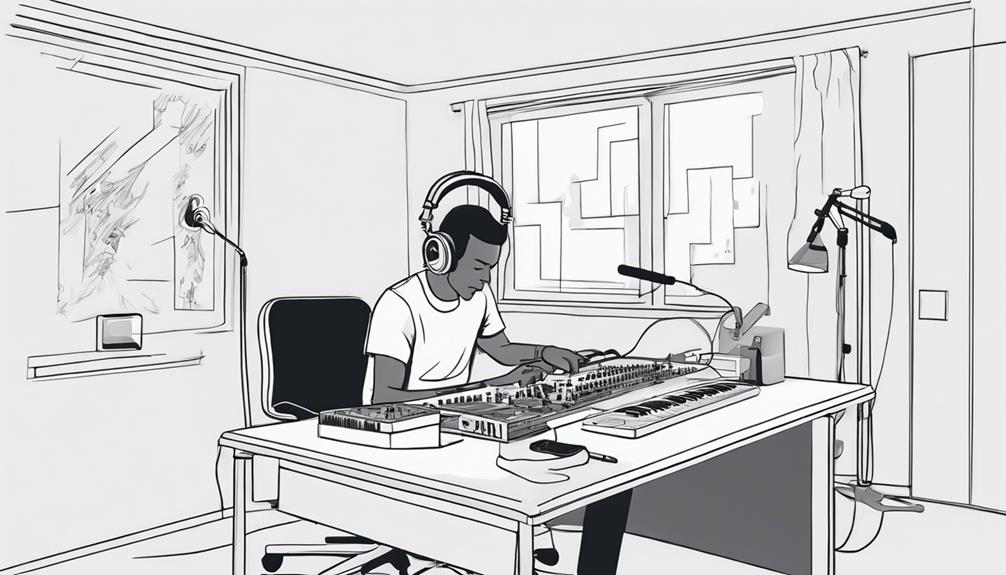
When recording music as a beginner, it's crucial to start with the basics of recording gear and understand the importance of room acoustics.
Basic recording gear, like quality microphones and audio interfaces, can greatly impact the quality of your recordings.
Additionally, creating a well-treated recording environment will help you achieve cleaner and more professional results.
Basic Recording Gear
For beginner music producers, acquiring essential recording gear like a computer, audio interface, microphone, and headphones is crucial to kickstarting your music production journey.
When delving into music production, understanding the basics of signal flow through your recording setup is essential. Connecting your microphone to the audio interface, which then links to your computer, allows for sound capture and processing.
Experimenting with microphone placement can greatly impact the quality of recordings, so don't hesitate to try out different positions to find what works best for each sound source.
Additionally, familiarize yourself with basic editing tools within your Digital Audio Workstation (DAW) to refine your recordings. These tools enable you to trim, adjust levels, add effects, and more, enhancing the overall quality of your audio.
As you immerse yourself in the world of music production, mastering these fundamental recording techniques will set a strong foundation for your creative endeavors.
Room Acoustics Importance
Optimize your recording space by understanding the critical importance of room acoustics in achieving high-quality audio recordings.
Room acoustics are pivotal for recording quality, directly influencing sound clarity and accuracy. Unwanted echoes, reflections, and standing waves can be minimized by implementing proper acoustic treatment such as foam panels or bass traps. These treatments enhance sound absorption and reduce reverberations, creating a more controlled environment for recording.
Additionally, setting up your studio monitors correctly in relation to room acoustics is essential for accurate audio monitoring. By optimizing your room acoustics, you create an environment conducive to producing high-quality recordings.
Audio Editing Fundamentals
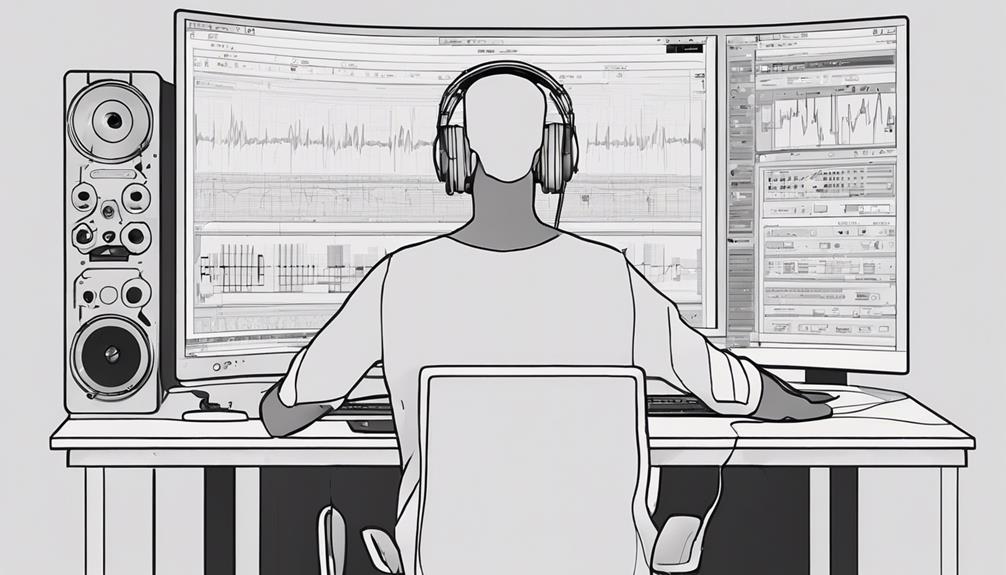
When it comes to audio editing fundamentals, you'll learn about basic editing tools and essential workflow techniques.
Understanding how to cut, paste, fade in/out, and adjust volume levels are key skills in audio editing.
These foundational principles will help you enhance the quality of your recordings and produce professional-grade tracks.
Basic Editing Tools
Enhance your audio recordings by mastering the fundamental editing tools essential for a polished finish. When delving into audio editing for music production, it's important to have a good grasp of basic editing functions. These tools are essential for tightening timing, correcting mistakes, and structuring songs to achieve professional-quality results. The table below outlines some essential editing tools to kickstart your audio editing journey:
| Editing Tool | Functionality |
|---|---|
| Cut | Removes selected audio segments |
| Copy | Duplicates selected audio segments |
| Paste | Inserts copied or cut audio segments |
| Fade In/Out | Gradually adjusts the volume at the start/end |
| Time-Stretch | Alters the duration of audio without pitch change |
Mastering these basic tools will allow you to refine your audio tracks, ensuring a polished finish. As you progress, you can explore advanced editing techniques like pitch correction and vocal comping for more precise editing in your music production endeavors.
Editing Workflow Essentials
A solid understanding of audio editing fundamentals is key to refining your editing workflow essentials for music production. When delving into audio editing for music production, mastering essential tools like cutting audio clips, adjusting levels, and ensuring seamless shifts is important. These tools play a significant role in tightening timing, enhancing quality, and ultimately producing professional-quality tracks.
In the domain of audio editing, software features are pivotal in achieving precise edits. Programs such as Adobe Audition, Audacity, and Logic Pro X offer a plethora of advanced features to aid in your editing endeavors. With these tools, you can easily remove unwanted noise, trim audio clips, apply fades, and create smooth transitions between different sections of your tracks.
Music Production Process Overview
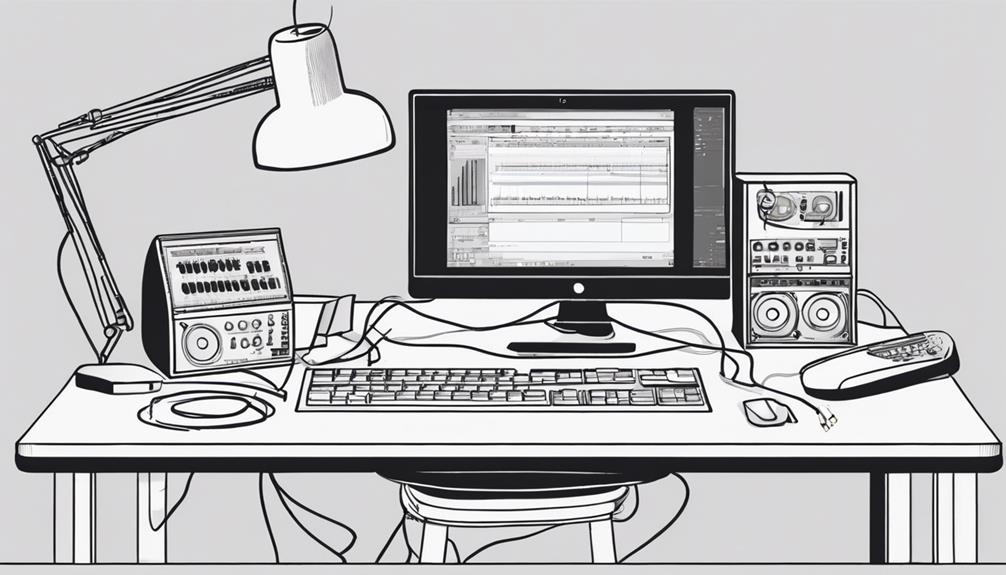
The music production process involves various stages, each playing a pivotal role in shaping the final sound of a track. Starting with composition and songwriting, understanding the core principles is important for guiding your track's direction.
Once you have your ideas, the next step is session setup in a Digital Audio Workstation (DAW). This initial organization sets the stage for your project.
Recording is where you bring your track to life by capturing vocals, instruments, and external sounds like hardware synthesizers. Each recorded element adds authenticity and depth to your music production.
Software and Apps for Beginners
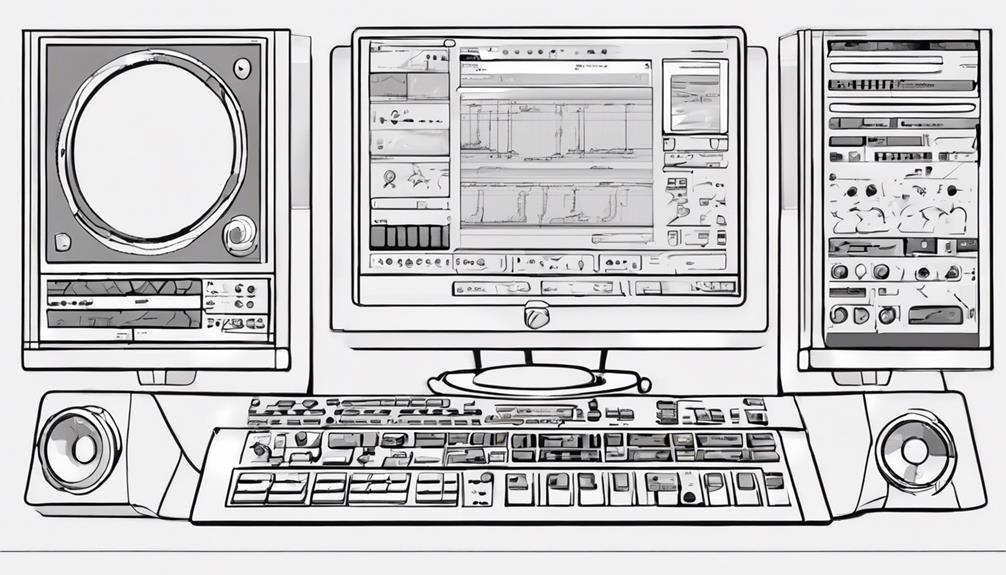
If you're just starting out in music production, exploring beginner-friendly software and apps can greatly support your learning journey.
For macOS and iOS users, Garageband is a fantastic option to get hands-on experience with a user-friendly interface.
Ableton Live 11 Suite stands out for its advanced features, making it a versatile choice for beginners looking to explore further into music production.
Logic Pro is a top pick among Mac users, offering a wide range of tools for creating music across various genres.
Studio One caters to both Windows and Mac users, providing a user-friendly interface suitable for beginners and professionals alike.
FL Studio is renowned for its intuitive design and vast library of plugins, making it an excellent choice for electronic music production enthusiasts.
Whether you're on macOS or iOS, Windows, or Mac, these music production software options offer a variety of features to kickstart your creative journey.
Frequently Asked Questions
How Do Beginners Start Producing Music?
Start producing music by selecting a Digital Audio Workstation (DAW) like Ableton Live. Learn basic music theory, experiment with loops, samples, and virtual instruments. Watch tutorials for insights. Record melodies, arrange in DAW, add effects. Immerse yourself and create!
Can I Teach Myself Music Production?
You can teach yourself music production! Immerse yourself in online tutorials, forums, and workshops. Experiment, practice, and ignite your creativity. With dedication and passion, progress from a beginner to a proficient producer, shaping your unique style.
How to Start Music as a Beginner?
To begin your music journey as a beginner, fully engage yourself in learning basic music theory and select a Digital Audio Workstation. Explore with free samples, invest in essential gear, and become a part of music production communities. Immerse yourself and relish the journey!
How to Produce Music Step by Step?
Start by setting up your workspace and connecting your gear. Lay down your ideas in your DAW, add effects, and mix your tracks. Experiment with recording techniques and arrangements to hone your music production skills.
Conclusion
Now that you have the basics down, you're ready to start creating your own music! Remember, everyone starts somewhere, so don't be afraid to make mistakes and learn from them. Experiment with different sounds and techniques to find your unique style, as this is all part of the creative journey. If you ever feel stuck, look up beginner tips for music production to help guide you through the process and provide valuable insights. Most importantly, stay patient and consistent—progress takes time, but every step counts!
If you're worried about not having enough experience or expensive gear, just remember that passion and creativity are what truly drive music production.
So go ahead, immerse yourself and start making some beats!

